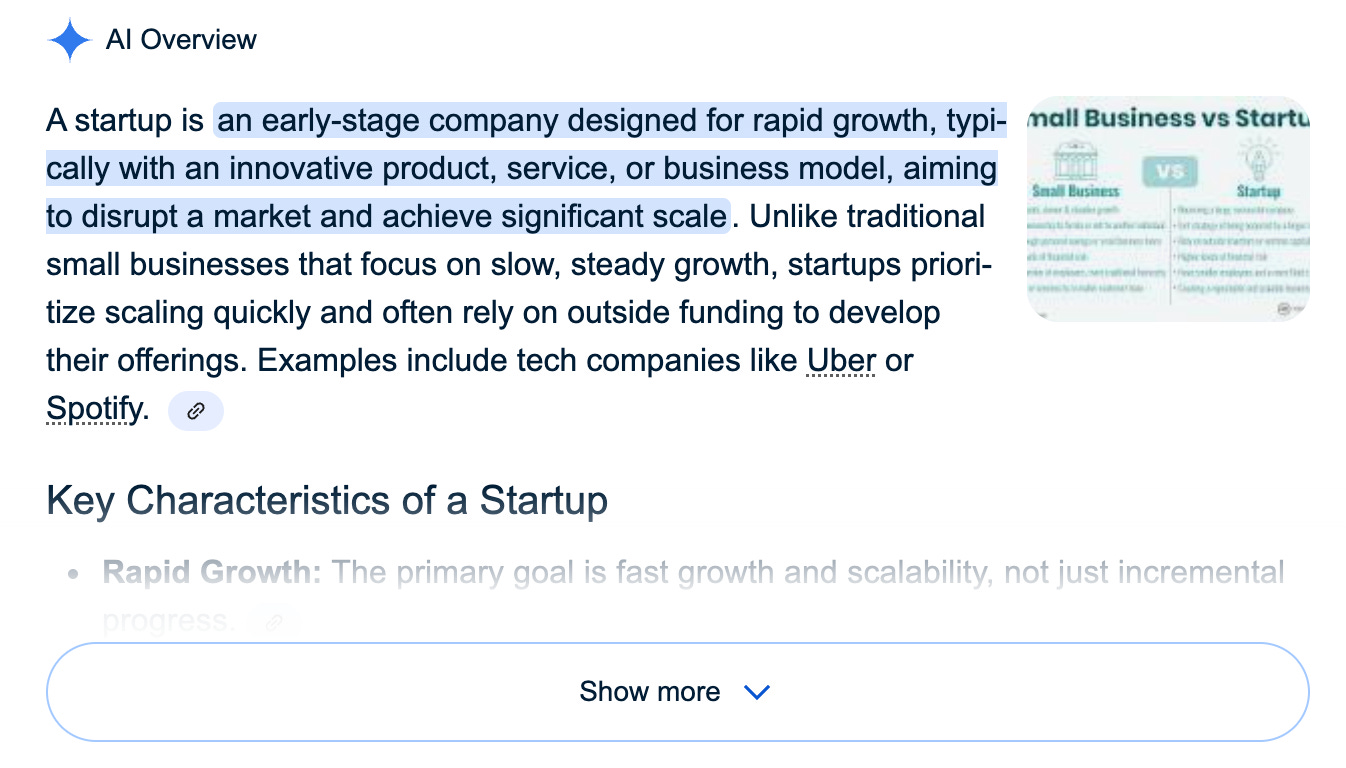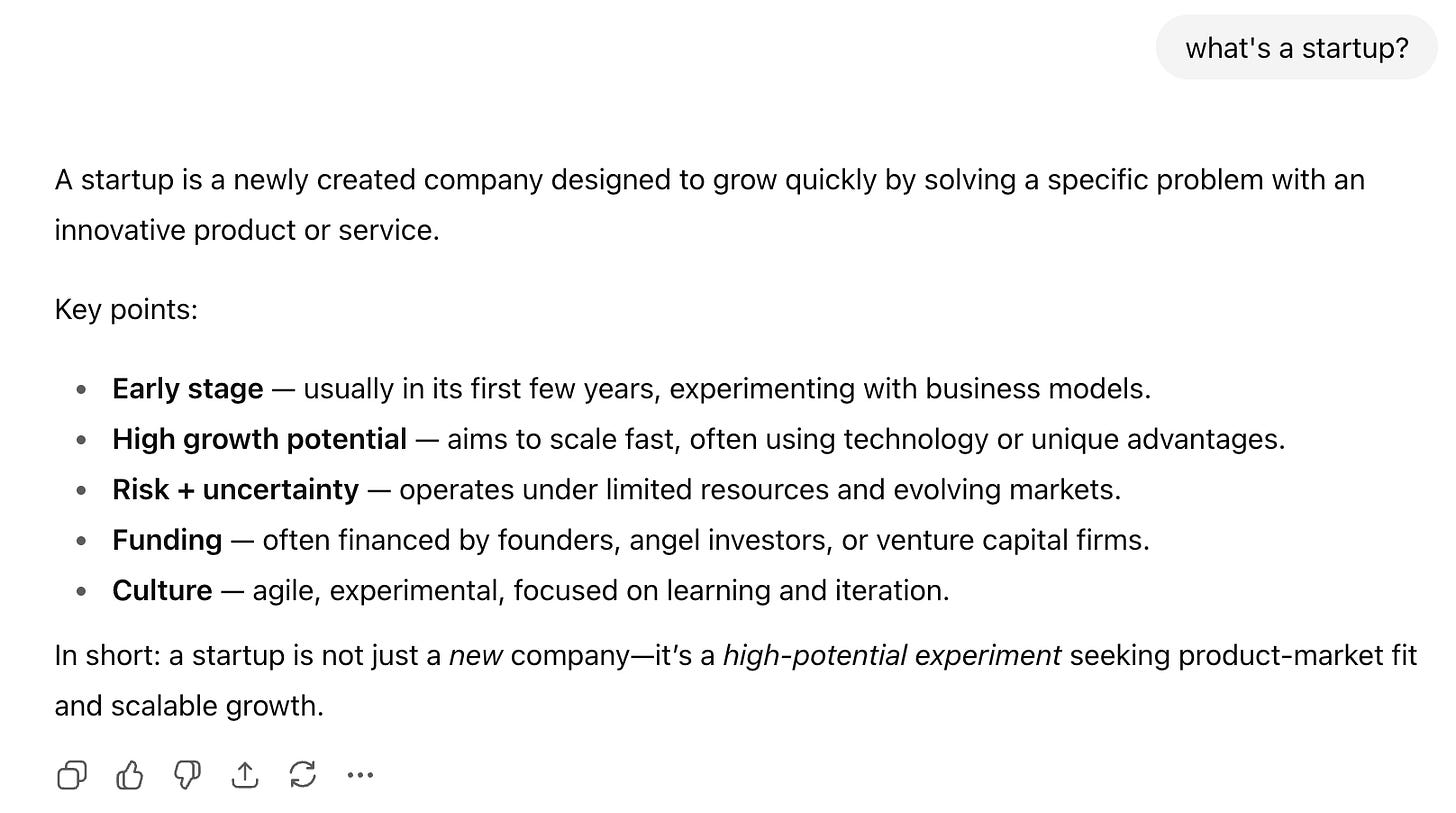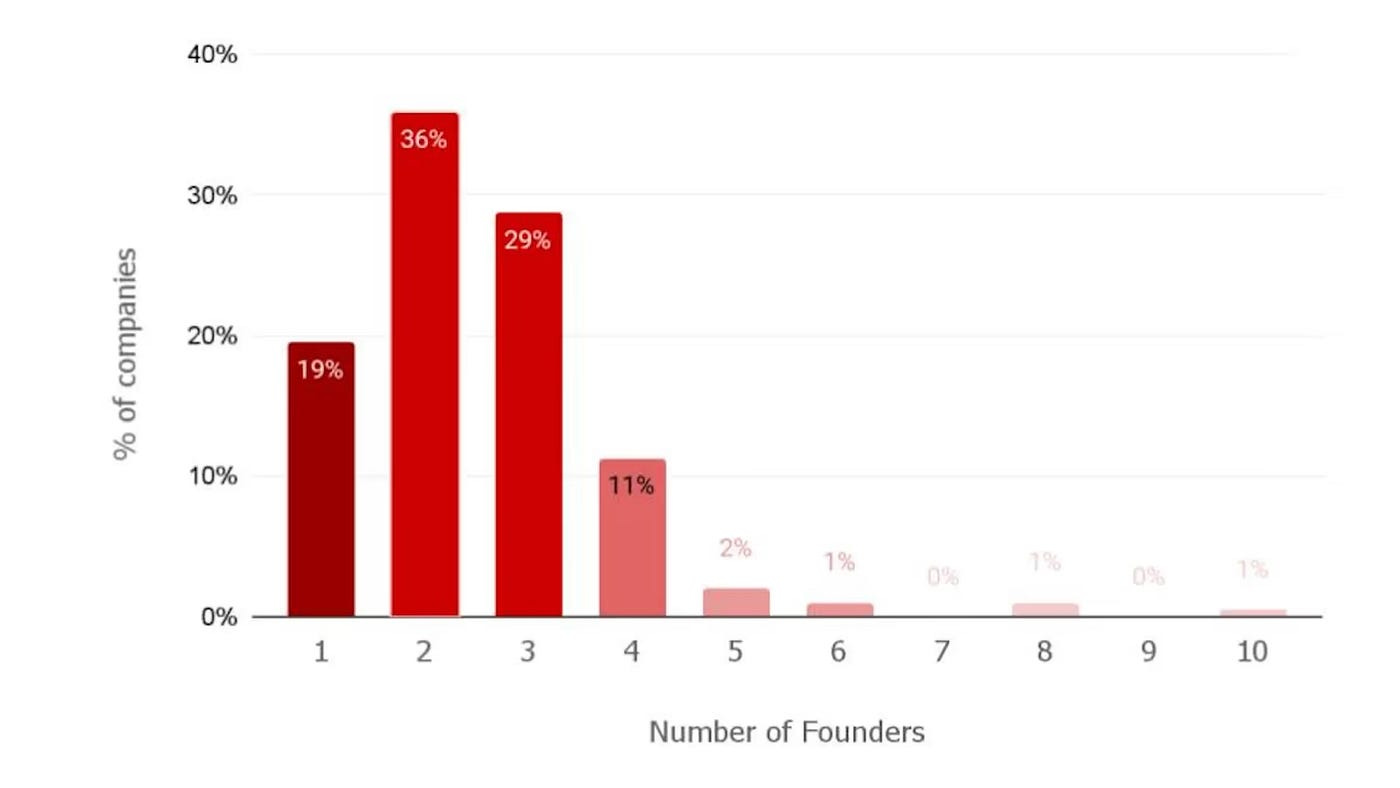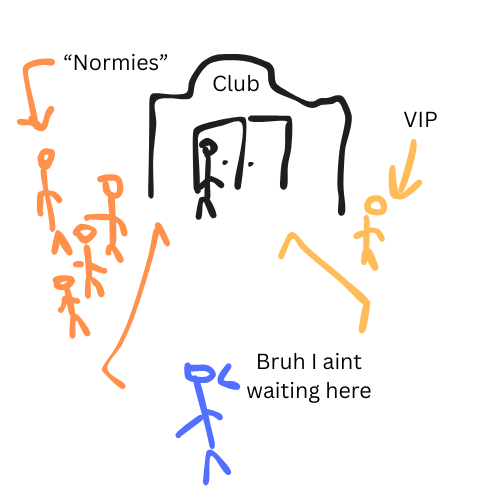What’s a startup?
I claim to love startups, to love entrepreneurship - but how do I define it?
Well, our friends at Google and OpenAI define it quite simply:
And although both these definitions are true, they avoid what startups are at their core.
At it’s core, a startup is made to solve a problem nobody has ever solved before, or to solve a problem better than the current person solving it.
- From the wise man himself, and yours truly, me - Noah
What a startup really is
Through following the principle that a startups’ core reason for existence is to solve the unsolved, it makes it so that if your truly “founding” a startup, your navigating in a constant unknown space - one that hasn’t been grasped by anything in humanity yet.
Because of this principle and belief, I view startups as its own inherent world.
A world that is constructed by all of societies problems.
This world is it’s own kind of utopia - a world that can’t ever be fully explored, because in order for us to have fully explored it, we would’ve had to solve every problem humanity faces, both now (present), and in the future.
And it’s just that, there will never be a time we stop facing problems as a society. Which means intrinsically, there will never be a time we have fully explored this “utopian world” of startups.
With that being said, what does it mean?
It means that there’s no playbook because no one’s ever been here before. There’s no set rules, there’s no guide, and there’s no built structure for when building a startup.
You’re building something nobody has ever done before. There is just you, and potentially the people you’ve brought along with you to go on about solving this problem.
How to Succeed & Navigate in a World of Unknown
OK. We’ve now settled down on a problem, how do you move forward? It’s pitch black, in this new world, where’s our flashlight? And how do we know we’re moving in the right direction?
IMO there’s three things you need:
Lifelong learning
The three mindsets to success (A “figure it out” (FIO) + antifragile mindset + beginner mindset)
Straight up luck — but both kinds
Each one of these stages to success come one after another, and have a particular order of which they come.
1. What is it to be a lifelong learner?
“In times of change the learners will inherit the earth” - Eric Hoffer
To learn is to keep on moving forward, it is to be adaptive for both the present, and for the future. By choosing to not learn, you’re choosing to do a great number of many other things; we call that opportunity cost.
The most dangerous outcome of refusing to learn, is that you will remain stagnant, to reach a peak and remain just that, until you erode and break.
If we focus on startups specifically, and study them, we can see that one of the most proprietary reasons giants fall is because they fail to adapt in volatile markets and times. A few companies come to mind when I think of this:
Blackberry
Blockbuster
MySpace
Blackberry especially, is an amazing case study on what happens when you don’t innovate, adapt, and refuse to learn.
Something else relevant to this context of being a “lifelong learner” is a quote my friend had mentioned the other day,
“Right now I’m the smartest I’ve ever been, and the dumbest I’ll ever be.”
I believe that if you want to reach some unconventional level of success, you have to live through this philosophy. Because through living in it, we humble ourselves, and remind ourselves that through learning, we will always be a beginner in some sort of way. And as a beginner, you gain a thirst to learn - which in turn, activates “The Three Mindsets.”
2. What the hell are “The Three Mindsets” ??
Great question.
The three mindsets are what follows after being a “lifelong learner,” they are mindsets that are naturally achieved from having such hunger for knowledge.
The three frames of mind include being a beginner, having a figure it out (FIO) approach, and an antifragile core.
You’ll see that through training each of these frames of mind, by virtue, greater things will occur almost by nature. So much that through doing so, the outcome of success builds upon itself and brings us to the next stage of creating your own luck (partially, but more on this after).
We’ll kick off with the first frame, being a beginner;
One of the GOATs said it best, the one and only Brian Chesky,
The bigger he gets, the more of a beginner he feels.
It took Picasso’s four years to paint like Raphael, but a lifetime to paint like a child. To be a beginner is to be curious, and that is to see the world with fresh eyes, to live // work without judgment, and never feeling like you’ve “made it.” Because once you believe you’ve arrived, you stop growing (which in turn is to stop learning - hopefully you get the connection and see the pattern).
Through being a beginner, we can see things that would’ve typically been overlooked. Because we are not blinded yet by expertise, assumptions, and our own arrogance.
When you’re new to something you question everything there is to it. You don’t accept “that’s how it’s always been done,” so you spot flaws veterans ignore. Whereas experts often filter reality. Experienced people see patterns - which lets them think quick, but also lead blindly. They skip over the depth of the issue because they assume the answer. Beginners will notice the awkward UX button, clunky onboarding process, the little friction, and so forth.
Those “naive” observations often lead to breakthrough design. After all, Brian Chesky was the one that said, “it’s in the tiny details that delight lives. Most people gloss over them. Beginners don’t.”
In correlation to this, something a good friend of mine recently said is “just when you reach the top of one mountain, you notice someone else standing in the clouds.”
You can’t have the mindset of believing that there even is an endpoint, or a peak; sure, you can be a big fish in a small pond, living on the mountain top.
It’s all about optimizing for what you want at the end of the day.
But I kinda want to see what the clouds are like, that’s for sure. Maybe I’ll see someone in space haha (hellooo Elon).
Figure it out (FIO) mindset:
In startups we don’t have the time, nor do we have the resources to not do the work. Simply put, if you don’t do the work, quickly and to a high standard, you will fail.
It is both a race and a marathon simultaneously.
The way we can possess a FIO mindset, is through holding such conviction in ourselves, that no matter what cards we’re handed, we trust ourselves to always find some sort of way to make ends meet, and finish the work needed.
The startup world moves quick, it’s speed is not relative to our time, and we cannot calculate it. This world can be thriving one day, and moving at an unprecedented pace - but then humanity can fail to keep up which leads to a bubble among many other things. It is an external factor to our success as founders, and all we can do is work within it, which is figuring things out is so important.
The greatest founders were amazing at “FIO” when it seemed impossible at face value. So many examples come to mind when talking about this, a great one is the beginning of DoorDash. Spun up “PaloAltoDelivery.com,” answered a Google Voice line, and manually delivered first orders.
Another good one is Reddit, the founders created tons of fake accounts to populate early posts/comments until real users arrived.
When Airbnb’s runway was getting short - they sold custom cereal boxes!! The opportunities are endless. You just have to think differently.
These are all great examples and reasons as to why you need to be thinking in a system where you refuse underperforming. You have to get the work done, it doesn’t matter - to any means possible.
There were so many opportunities to quit and fail in these examples listed, yet these amazing founders created opportunities out of nothing, and found the few things that could’ve actually worked out. All through thinking differently, and having the mindset that they could figure out whatever was thrown there way - the mindset capable for greatness.
Side note ::Would you believe me if I said my old LinkedIn bio used to say “Figure It Out Enthusiast”? So this one is held close to my heart… Hits home.
The antifragile core
The startup world is unpredictable. As mentioned before, it is a world of unknown. A world that can never be fully explored, as it is only somewhat explored by subject to the problems we know of - that have actually been solved.
Because of this unpredictability, we have to get comfortable with being in these unknown spaces - it’s an external environment that we cannot control, but in ways can manipulate it, and take advantage of the mass volatility.
This third mindset is derived fully from Antifragile: Things That Gain from Disorder, by Taleb - one of my favourite reads out there.
Taleb says, “Wind extinguishes a candle and energizes a fire. Likewise, with randomness, shock, and volatility: you want to be the fire, not the candle.”
Both the candle and fire cannot control the wind, it is an external force. However, they can place themselves in unique environments to grow, and thrive from the wind. This same philosophy applies to startups - we can use these external forces of being in an unknown environment, and take advantage of the volatility - not to scare from it, but to grow from it. Just as a fire would to the wind.
Through building an antifragile core, we can navigate the startup world to our best ability. Especially when combined with the other two mindsets of being a beginner, and to figure it out - we can combine these three systems to craft a great founder.
Luck in success + making your own (partially…)
There’s no doubt that luck plays a huge role in success - it’s in every aspect of winning in startups. Various factors like timing, people you meet, current economy, etc.
Instagram (or at that time “Burbn”) - literally raised there seed round from a16z and Baseline ventures from meeting them at a Hunch party.
Inversely, and more recently, Google got rid of the num=100 parameter - Reddit used to be a powerhouse in citations for AI. However with this new update, there rankings plummeted. Reddit’s citation share on ChatGPT had fell from approximately 29.2% to just 5.3%. In doing so, there stock tanked 15% in the span of 5 days - roughly $6.5B gone.
How could Reddit have seen that coming? They couldn’t. There’s just things out of anyones control because of the uncertainty.
It’s a big “right person, right time” game. There’s so many ways the “wind” could blow - that sometimes you get unlucky. Many can argue that since there are too many variables that goes into building a successful startup (worth $10M+), even if it’s not random, it’s too complex to be controlled.
And I agree with this, but to an extent.
There are external factors we cannot control, but that is in everything we do - you can be at a cushy corporate job, however a recession can occur and you can get laid off, or perhaps get passed on a promotion. I know is startups a far more volatile market than the corporate one - so luck plays a much larger factor, but you get the point.
I believe there are ways that we can make our own luck - I actually think a good portion of our luck is earned.
If we break down what luck is, it’s a fraction, odds. “How many times out of x number of times will I strike out?”
The odds of founding a unicorn through scaling a lemonade stand is minimal, yet the odds of founding a unicorn through scaling a startup in an interesting space, solving a genuine problem, with some sort of emerging technology, is a lot higher.
Not only that, but factors like how many startups you’ve worked on prior, or the number of people you’re working with play huge roles as well. This isn’t hyperbole either, it’s backed by real data.
According to First Round’s 10-Year Project, teams of more than one founder outperformed solo founders by 163%.
Ali Tamaseb, who analyzed 195 unicorns, the odds of succeeding nearly double when moving from a single-person team to a two-person or three-person:
I can go on, but the point I’m trying to make is that there are things we can do to increase our odds, and naturally, increase our luck. We create our own luck through building our own opportunities when there’s none to exist - I love the concept of “The Third Door” for this exact reason.
The third door talks about the two ways we can enter a club - you can wait in the long line with the normies, or alternatively you can go to the VIP line.
Couple problems,
A: it’s cold, and waiting in a line sucks.
B: we’re not cool enough to be in VIP.
So what do we do? We make the third door ourselves - whether that door be paying off the bouncer, kicking in a window at the bathroom, acting like a famous person, etc.
Opportunities are rare because they’re out of our control, but we can make them more common if we create them ourselves, therefore putting them within our control, and within our reach.
For instance, one of my friends needed to raise VC money » no VC would sit down with him » he ordered pizzas, dressed as a delivery guy, and put a QR code inside each box. Physically WENT to the VC offices and delivered them » when the VCs opened the lid, it linked to his demo, pitch deck, and one-pager.
He got a call back from every VC firm he went to. And then raised some money.
If you still want to build…
At the end of the day, startups aren’t about pitch decks, or seed rounds. It’s about choosing to build something in a place where nobody can tell you what to do, because nobody’s figured it out yet. A startup is just the tool - the real thing is deciding to live in uncertainty on purpose. As long as there are problems, there will be people trying to solve them. And I’d rather be out there trying, even in the dark, than sitting around waiting for someone else to turn on the lights.
If you made it this far, thank you! This essay in particular was especially long, so the time you’ve given me means so much more than you might realize. I’m sure your a very busy person.
I’m using this blog experiment to let people get to know me + what I believe - and hopefully connect with more of you along the way. If you have any questions about what I’ve done, or would just like the chat - hit me up at pointone@barbaros.ca - if I don’t get back within 24 hours, coffee’s on me.
Once again, thanks for your time.





